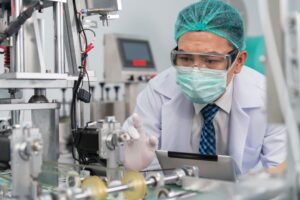 Wisconsin’s strength in biohealth extends well beyond the laboratories where researchers are working to develop new drugs and therapies.
Wisconsin’s strength in biohealth extends well beyond the laboratories where researchers are working to develop new drugs and therapies.
The state’s historic strength in manufacturing is also a critical element in its biohealth sector, and the partnership between the two sectors is fueling economic growth for both of them.
As Wisconsin biohealth companies are designing devices and equipment, they rely on Wisconsin manufacturers to supply production systems, make components, develop customized equipment, and test for safety and efficacy. Wisconsin manufacturers provide the supply chain that allows labs and assembly lines to operate—in Wisconsin, throughout the U.S., and around the world.
To take a few examples:
- Hudson-based Phillips-Medisize collaborated with Exact Sciences to design Cologuard, the Madison company’s stool-based test kit for colorectal cancer, and now manufactures and ships more than 1 million of the boxed kits to patients every year.
- Teel Plastics, in Baraboo, has produced more than 2.5 billion swab sticks used in COVID tests.
- GE HealthCare—the largest single biohealth industry employer in Wisconsin, with 6,500 employees in the state—says it has more than 1,100 Wisconsin-based suppliers and buys more than $400 million of their products each year.
In 2021, Wisconsin businesses provided more than $6 billion in goods and services to Wisconsin biohealth companies, according to BioForward Wisconsin, the state’s biohealth industry organization.
“Biohealth remains one of the strongest industries in Wisconsin for many reasons, including innovative approaches by companies, the growth of its workforce, and the significant focus and accomplishment of the region’s exceptional biohealth manufacturing ecosystem,” said Michael Harrison, BioForward’s director of strategic initiatives and community engagement. “When other states and markets struggled with supply chain challenges created by the pandemic, Wisconsin’s biohealth cluster continued to flourish, with critical solutions being supported by a robust network of local suppliers, distributors, and manufacturers.”
Wisconsin’s recent designation as one of 31 Regional Technology Hubs across the U.S. shows that “others have begun to look at Wisconsin as a case study in excellence,” Harrison said.
Medical device and equipment manufacturing accounts for about 12,000 jobs in Wisconsin, while makers of components, metal fabrication, printing and packaging, and other types of biohealth-related manufacturing represent nearly 3,700 jobs, according to BioForward’s 2022 report on the industry.
These are some of the companies involved:
Phillips-Medisize
 Phillips-Medisize, a subsidiary of Illinois-based Molex, designs and manufactures a wide range of products and components that are helping to save lives, Michael Dover, director of manufacturing technology, told the Wisconsin Biohealth Summit in Madison in October. In addition to the Cologuard cancer test kits, some of Phillips-Medisize’s products include pens that deliver insulin and wearable glucose monitors, as well as complex cable assemblies used in devices to treat atrial fibrillation.
Phillips-Medisize, a subsidiary of Illinois-based Molex, designs and manufactures a wide range of products and components that are helping to save lives, Michael Dover, director of manufacturing technology, told the Wisconsin Biohealth Summit in Madison in October. In addition to the Cologuard cancer test kits, some of Phillips-Medisize’s products include pens that deliver insulin and wearable glucose monitors, as well as complex cable assemblies used in devices to treat atrial fibrillation.
The company “makes solutions here but exports them across the globe,” Dover said.
Phillips-Medisize’s “primary focus and fastest-growing business” is in the medical industry, said Candace Bowering, senior director of medical and global strategic marketing. The company has manufacturing plants in Menomonie, New Richmond, Eau Claire, and Phillips, in addition to its headquarters, design and development, and manufacturing hub in Hudson.
Teel Plastics
 Teel Plastics’ swabs have been used well before and beyond the COVID-19 pandemic; they are also used for forensic and scientific analysis and for safety testing in food processing.
Teel Plastics’ swabs have been used well before and beyond the COVID-19 pandemic; they are also used for forensic and scientific analysis and for safety testing in food processing.
Teel also makes blood tubing, respiratory device components, endoscopic surgical components, and a variety of other medical device parts. Biohealth products represent about 15% of sales for the company, which has more than 400 Wisconsin employees, said Christian Herrild, director of growth strategies.
“Biotech has been part of Wisconsin’s manufacturing history and is also fueling exciting new growth. From early generation artificial insemination to cutting-edge gene marker testing, it is an industry that has been at home in Wisconsin’s manufacturing sector since the 1960s,” Herrild said.
Plexus Corp.
 Plexus Corp.’s health care and life sciences sector grew approximately 20% last year to reach $1.9 billion for fiscal 2023, representing 44% of total company revenue, said Michael Tendick, vice president of the health care/life sciences.
Plexus Corp.’s health care and life sciences sector grew approximately 20% last year to reach $1.9 billion for fiscal 2023, representing 44% of total company revenue, said Michael Tendick, vice president of the health care/life sciences.
The Neenah-based company—which provides design, contract manufacturing, and sustaining services—has about 2,000 Wisconsin employees, and partners with nearly all of the largest life science and medical device companies in the world. Plexus helps create products that include diagnostic imaging systems, monitors that check vital signs during surgery, and instruments used in robotic surgery.
“In pursuit of our vision to help create the products that build a better world, we have all the capabilities to bring a full medical device to market as well as to extend the life cycle of that device in the market,” Tendick said.
Prent Corp.
 Family-owned Prent Corp., in Janesville, is the “largest and only privately held custom thermoformer for medical devices in the world,” said Jesse Winker, director of product development.
Family-owned Prent Corp., in Janesville, is the “largest and only privately held custom thermoformer for medical devices in the world,” said Jesse Winker, director of product development.
Prent provides packaging for all of the major medical device companies in the U.S., and designs and engineers its own tooling and production equipment as well. “If you went in for hip replacement surgery, Prent would not only have provided the packaging for the surgical devices but also for the implant itself,” said Chris Bladl, vice president of product development.
Prent has more than 600 employees in Wisconsin, of about 2,000 employees worldwide.
Rockwell Automation
 Rockwell Automation, a global provider of industrial automation systems headquartered in Milwaukee, offers biotech companies the opportunity to test their production systems even before they are built by creating digital twins. Using digital engineering simulations, they can make sure the systems will work properly and check for potential bottlenecks.
Rockwell Automation, a global provider of industrial automation systems headquartered in Milwaukee, offers biotech companies the opportunity to test their production systems even before they are built by creating digital twins. Using digital engineering simulations, they can make sure the systems will work properly and check for potential bottlenecks.
“We are applying newer technologies such as artificial intelligence and machine learning into some advanced applications,” said Michael Cook, director of academic enablement at Rockwell. “The digital twins allow us to visualize these applications in advance. They simulate the process … as if we already built it.”
The simulations can “dramatically reduce” engineering and commissioning time, save money, and help companies get their products to market more quickly, Cook said. “This new technology can certainly drive more productivity and more sustainability in manufacturing. That’s quite a big deal,” he said.
The process can also provide the data needed to ensure that even if a manufacturing run is just for one patient, it will deliver a high-quality and safe product. This capability represents a big step forward for personalized medicine, which may call for a specific medication or dose size to correspond with a patient’s unique genetic makeup.
Founded in 1903, Rockwell Automation has locations around the U.S. and worldwide. Wisconsin has several advanced manufacturing sites, Cook said.
At the same time, Rockwell is developing the future workforce for its own needs and those of other manufacturers. The company has been partnering with Gateway Technical College in Kenosha to offer the Academy for Advanced Manufacturing to train students in the new manufacturing techniques.
“It’s the kind of technology I’d like to put in all of the community colleges in Wisconsin,” Cook said.
He said that with recent state investments in community and engineering colleges, Wisconsin is poised for success.
“In the 20 years I’ve been here, it has never been more exciting,” Cook said. “We’re on the cusp of something big.”
Cook, Winker, and Dover were among the speakers at a panel discussion on the state’s biohealth manufacturing ecosystem at the Wisconsin Biohealth Summit in Madison, presented by BioForward, in October.
